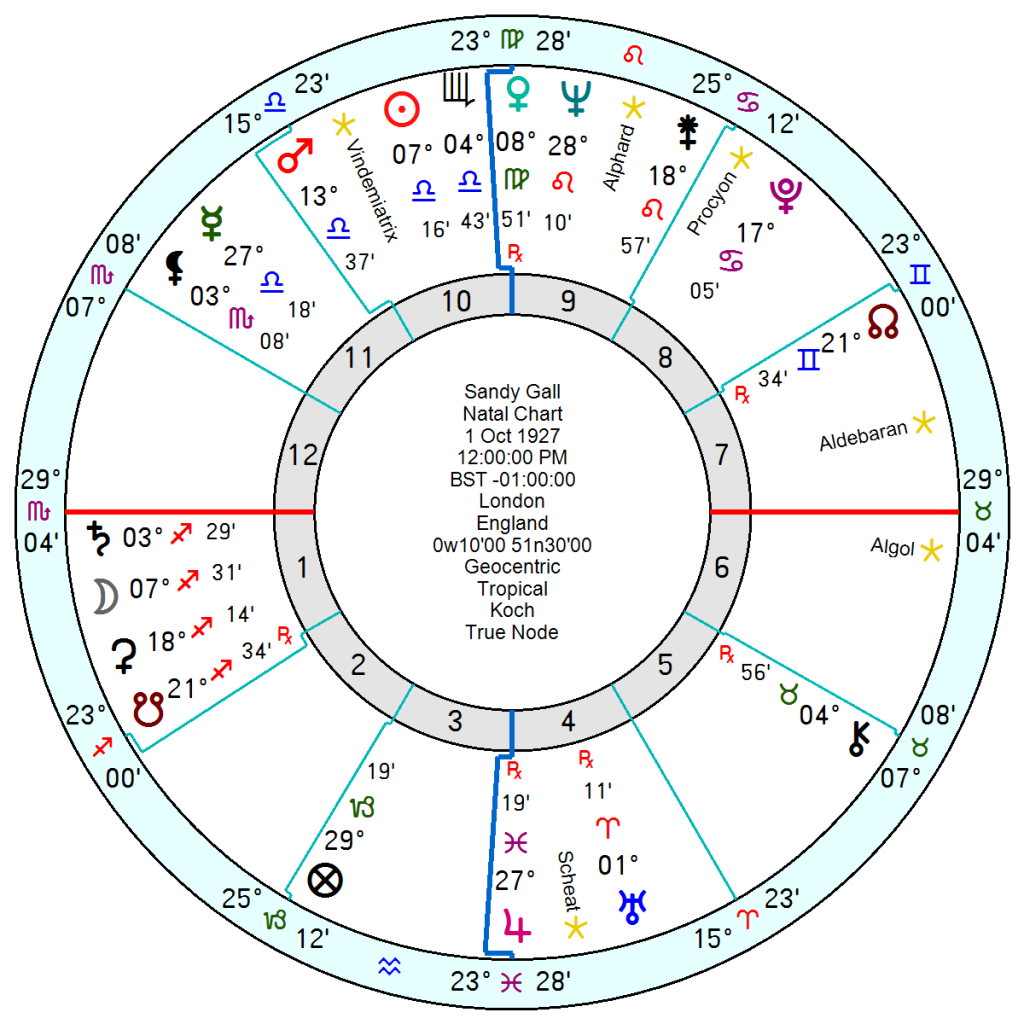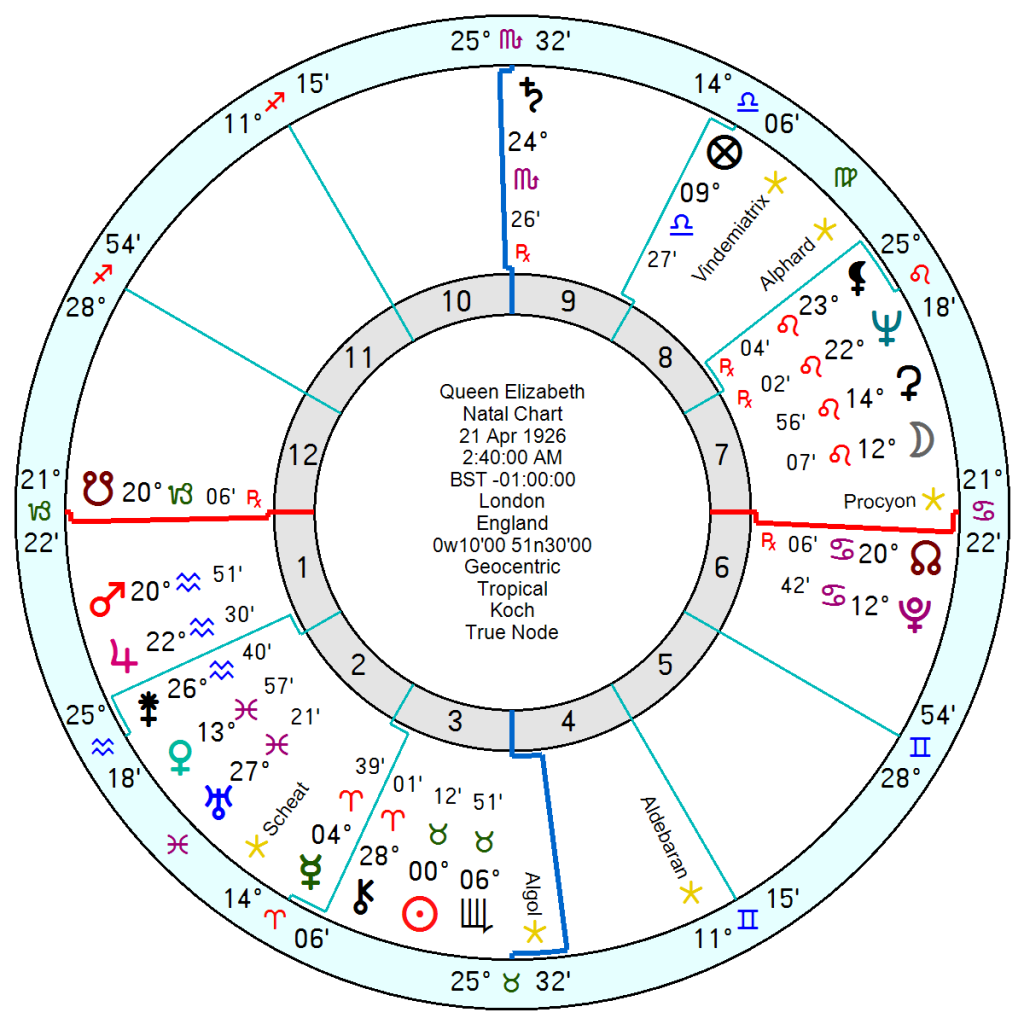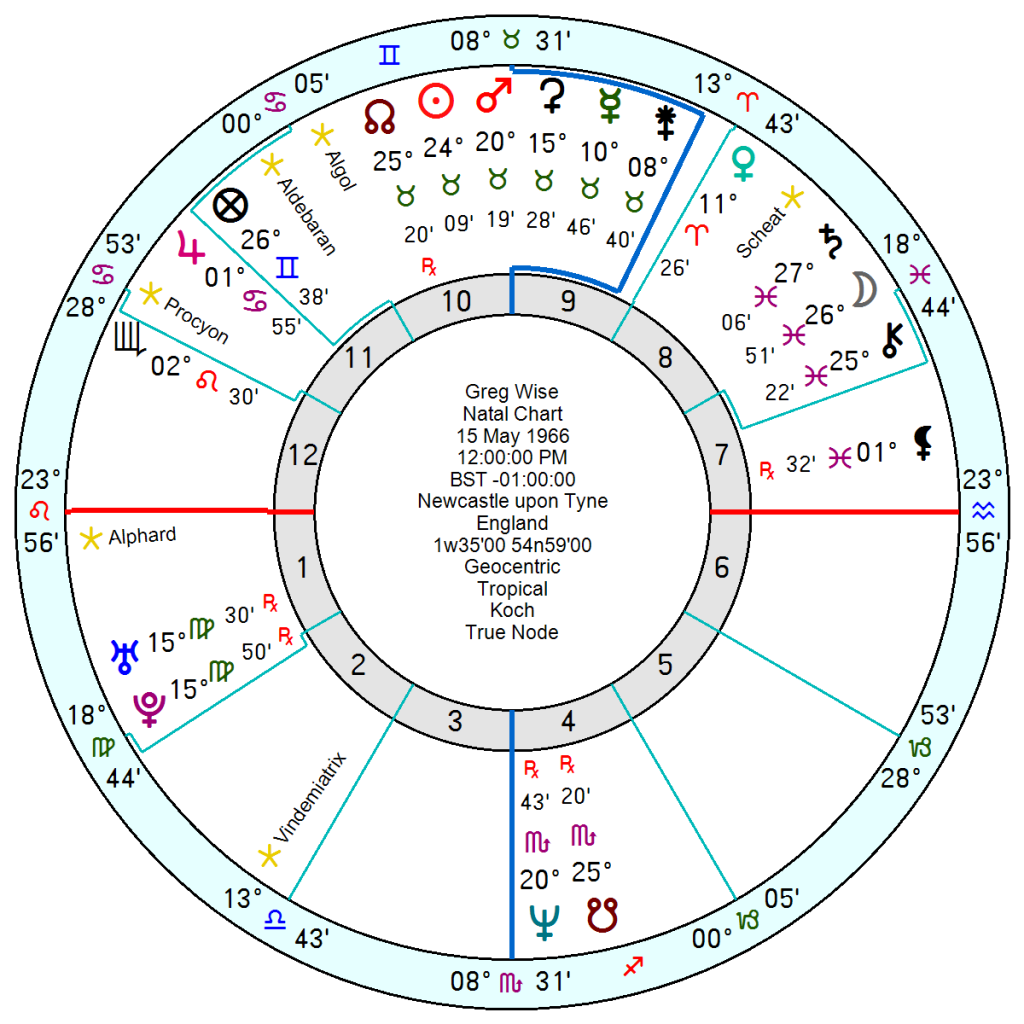




Why do certain individuals thrive undeservedly while others get landed with an unfair lifetime of setbacks? Why do others overcome monumentally horrible problems to thrive?
Not much astrology here in terms of examples, more random and varied thoughts.
What astrologers need to keep in mind is that not everyone lives out the full potential of their charts. Gauquelin (I think) found the most successful were the ones who did. Gifts lie unused. Regrets fester about opportunities ducked. Is it about risk-taking? Being too timid, too tied to what is familiar? Sliding back into the South Node. A life not lived.
Life is unfair – a strong Jupiter gives luck even to those who did little earn it. A really difficult Saturn or Pluto can set up a mountain of difficulties which not everyone has the tenacity, self-discipline or determination to overcome. Trump and George W Bush (whose wreckage of Iraq/the Middle East has never brought any comeuppance) both have strongly aspected Jupiters. There may be less pressure on the Jupiterian ones to learn self-awareness and indeed learn from mistakes.
Carl Jung thought the mid-life crisis of 38 to 42 years old – tr Uranus opposition Uranus, tr Pluto square Pluto, tr Neptune square Neptune, was the critical turning point for most. Those who opened up to themselves, dug deeper for answers inside and – Uranus (= took a risk) – had a revitalised second half of life while those who buried their heads in the sand, start to stagnate and deteriorate towards old age prematurely. I am not sure that is all of the story but it may be part.
The Saturn Return at 29 is another staging post which offers a choice about getting real, growing up and taking responsibility for your life – which not everyone does.
Why not? The ‘old soul’ argument is tempting though I tend to shy away from what sound like elitist justifications. But it is true that some are – more curious? Need to know what life is about and where they fit in; and perhaps most significantly are willing to take risks and try the less familiar. While others don’t ask those questions and bumble along blind and deaf to anything other than doing what is expected of them.
Which brings up another thought. Social cohesion is dependent on (if I may show my Uranian contempt for normality) doing what others do, not rocking the boat, suppressing a chunk of personal identity to fit in. If there were too many rebels and non-conformists around it would threaten social stability.
In the natural world there needs to be a balance between structure and creativity, between establishing a strong foundation for a species/plant and when circumstances change for the ability to adapt (Darwin). The rebels and status-quo upsetters are the ones to spearhead necessary changes – but equally can be damaging during periods when when a society needs to settle down to consolidation in the new phase.
It may therefore be that people fall broadly into one or other category – and most will be of the security/stability takes-priority mindset even if it means burying a large chunk of their personal identity.
On that argument individuals not living out their full potential in terms of unique abilities may be a social imperative.
Those who do live out more of themselves may well be more successful because they are the ones who instigate change when it becomes necessary – or even just take the lead as part of the normal process of gradual evolution.
One story which always sticks in mind is John Addey, who was/is one of the leading lights in astrology. Born 15 June 1920 8.15 am Barnsley, England, he was an active sportsman at school until struck down by severe Ankylosing Spondylitis around the age of 20, which left him unable to walk without the aid of a stick for the rest of his life. During his initial enforced period of immobility he turned his life towards philosophy and astrology. Life handed him a major setback which he turned to a great advantage.
He was a Sun Venus in Gemini with a Gemini Moon square a Saturn opposition Uranus, so he would be a thinker and communicator and flexible. Around the time when he was struck down his Solar Arc Moon in a Mutable T square (square Saturn opposition Uranus) was conjunct his Sun for a game-changing phase in his life. And he took up the baton and ran with it, making the best of a difficult situation.
What strikes me as almost more relevant was tr Pluto then about to move across his Ascendant into his 1st house for almost fifteen years thereafter, which I think is one of the most useful transits – and not everyone gets it since Pluto takes 250 years to move round the zodiac. It deepens self-awareness and begins a search for self-knowledge which is invaluable. He also had his Solar Arc Mars conjunct his 4th house North Node in Scorpio – which was another hint to go deep and develop inner depths even if it meant abandoning what had once been a hope for a different life.
Another thought is to find a lifestyle that suits the chart which sounds self-evident but often is not. Being pushed into becoming an accountant or nurse or truck driver when your inclinations lie elsewhere is all too common. When tr Saturn moves across the Ascendant into the First quadrant for around 7 years is a time to take a step back and explore where the real potential is and how to develop it. In younger years, living out the parents’ ambitions is common. But the old psychology trope that apple seeds grow into apple trees and orange seeds grow into orange trees needs to be kept in mind. If the parents are overly dominating (or the culture) then an apple seed may never have a chance to grow in the direction for which it was designed.
Context is all – find a lifestyle that suits who you are. Sandy Gall is a prime example of how to utilise difficult chart aspects. He was a TV reporter and foreign correspondent who had several brushes with death in the Congo and then in Idi Amin’s Uganda, was later reported lost in Saudi Arabia, bombed in Afghanistan and was the first reporter into Kuwait with the Allied forces in the Gulf War of 1991. He has died aged 97 and an obituary said: ‘He survived on wit, charm, courage and no small amount of good luck.”
He was a Sun Libra opposition Uranus – so would have been hopeless in an assembly-line or even civil service job. More significantly his Sun was conjunct Mars square Pluto – he would be attracted to high-adrenaline, high-jeopardy situation and have courage. In a different lifestyle Mars square Pluto can be exceptionally problematic since it tends to attract disasters. He volunteered for them.
He also had Jupiter on the focal point of a yod inconjunct Neptune sextile Mercury, giving him confidence, luck and I would imagine an insane amount of optimism about getting out alive.
If his chart had been born into run-of-the-mill circumstances and been stuck in a normal life, it would have created all manner of problems.
Know thyself and live accordingly. Carl Jung: “Freewill is the ability to choose that which I must do.”
Queen Elizabeth 11 is a prime example with an incredibly Fixed and overly conscientious chart. She settled into ploughing the same furrow (fixed) for her entire adult life – in the process living out who she was and holding the country together. Hers was a life of self-sacrifice but she was also living out her identity.
Actor Greg Wise, husband of Emma Thompson, also has extracted the best out of his Sun, Algol, North Node, Mars conjunction in Taurus, as he campaigns with Marie Curie Hospices for open discussions about end of life. His close friend drowned when he was in his 20s; he spent time with both of his parents in their final months and was the carer for is sister when she died of cancer. (See previous post in Search). That Taurus collection could have been truly difficult bringing him more first hand experience of death than most but he has embraced who he is and turned it to good use.
Will a chart say who has choices and who doesn’t? I am not sure. There is an ‘unknown’ which the chart won’t articulate which I sometimes refer to as an element of grace but that does not explain much.
Some individuals can turn difficulties into character-building strengths, others become destroyed by similar setbacks. Some lack self-awareness and I see this the older I get which is exceptionally sad, even tragic. Some never seem to learn from their mistakes and go regretfully or resentfully into that dark night without ever realising they had choices.
Chapter I
“I walk down the street.
There is a deep hole in the sidewalk.
I fall in.
I am lost… I am hopeless.
It isn’t my fault.
It takes forever to find a way out.
Chapter II
I walk down the same street.
There is a deep hole in the sidewalk.
I pretend I don’t see it.
I fall in again.
I can’t believe I am in this same place.
But it isn’t my fault.
It still takes a long time to get out.
Chapter III
I walk down the same street.
There is a deep hole in the sidewalk.
I see it there.
I still fall in… it’s a habit… but,
my eyes are open.
I know where I am.
It is my fault.
I get out immediately.
Chapter IV
I walk down the same street.
There is a deep hole in the sidewalk.
I walk around it.
Chapter V
I walk down another street.”
Portia Nelson

“Give me a child for the first seven years and I will show you the man.” Jesuit maxim.
This explains everything.
Thank you for this post, Marjorie, and all the insightful comments. You’ve all given me so much to think about.
Dear Marjorie, Many thanks for your article on John Addey whom I had the pleasure of chatting to in the late 1970’s as we waited in the queue for tea. He was addressing the Astological Association meeting in Gt Russell Street about his research (and book) on Harmonics in Astrology ; I was a student back then. He was smartly dressed in his tweed jacket and walked with a limp despite his walking stick ; I carried his tea for him. What rings a bell with your analysis of his chart is that he ‘wanted to get to the bottom of everything’ – as you say – very much driven by the SA Mars conjunct Node, and the curiosity, communications skills, and charm which came seemlessly to him (Gemini). A truly great Yorkshireman an’all!
So it is Portia Nelson who wrote that end piece in this post!!
In my natal “lucky” Jupiter in Libra, conj NN, opp Mars, opp Moon….. I have certainly been fortunate with the right people, the right teachers, the right whatever to come to me. So fortunate!
Many, many years ago, one of those people offered me a much more concise version of Portia’s words:
1. I walk down the street and fall in a hole
2. I walk down the street, see the hole and fall in the hole
3. I walk down the street, see the hole, fall in the hole AND KNOW I AM IN THE HOLE!!!
4. I walk down the street, see the hole, fall in the hole, know I am in the hole and find a way out
5. I walk down the street, see the hole…. and walk around the hole!
I get such a kick out of reading and feeling in my body.. each of those steps when dealing with something in my life. My absolute favourite step is Number 3….. to still repeat a not terrific situation or behaviour… but to KNOW it at the same time! That’s finally finding the breaker switch!!
Great post, Marjorie. I, too, have spent time wondering about this….. I’ve had so many clients over the years to be a witness in their lives. Jeffrey Wolf Greene, in his first Pluto book, I believe… described a pyramid split into equal thirds horizontally. The very large lower 1/3 was the Herd Mentality… safety and security. The middle 1/3 is Individuation… I/me/Self. And the top very small point 1/3 was Spirit/Acceptance/Non-attachment, etc. I recall that he wrote… we each have all 3 levels in us, of course, but will be in one of these levels more strongly.
This description actually helps me have compassion. Maybe like Marjorie said above, if the pyramid was upside down, that would not be sustainable re: safety and security!? Many people I know are very happy in the Herd place! I chuckle and think, well.. ignorance can be bliss… in a way!! 🙂
and, yes…. curiousity is so important. Maybe a strong Mercury?… or have it connected to Uranus? or in Leo? or in Aquarius?
and, humour…. humour about yourself!!!
That’s also really important and possibly is part of the curiousity!
There’s a well-known quote from the stoic, Marcus Aurelius – “The impediment to action advances action. What stands in the way becomes the way.”
Thanks for this fascinating article, Marjorie.
Thank you.
this hit so deep. might explain this need to figure out my chart even if I can’t wrap my head around it yet, just to figure out why, me the black sheep of this ever-shrinking tiny dysfunctional family would be the one they always called on in the end to help.
It opens up the idea that the smallest ones, the perceived as weakest see farther and try harder than the ones with the most talent or brains.
I have never forgotten what my mother said to me, at the age of 7, when I asked her why life was so hard for me.
Well, some people are just born with the fickle finger of fait she said.
It was not reassuring. It haunts me.
I think it makes me fight harder even as things get tougher.
I have accomplished more than I ever thought I and none of it has been award winning or get promoted kind of stuff. Just making it through life kind of stuff.
Feels good to look at this all differently.
I came out of Hospital on Monday evening after having some kidney stones removed. Twice I had a DNR suggested to me. Each time I refused. That while I can appreciate that there are others, especially those that have to endure dialysis: it really is an individual’s choice, and should be respected as such. The first doctor basically told me I had nothing to worry about if it turned out to be kidney stones. But the second one, who hung about the ICU like a bad smell, took it badly when I refused. He did try to bully me, into signing it. And for that, I will not forgive!
That man went into an area that is purely for a patient with compromised immunity, only to hear her screech ‘I don’t want to die!’ This was followed by the exit of The Grim Reaper and 3 doctors, who seemed to object to the whole thing. At least they were challenging him on it.
I think it is important for people to realise that patient’s at their weakest are being treated this way and not for always a good reason. I have to return for another procedure and perhaps a few more in order to remove all the stones. So I at least know what to expect. But to have that put to you when you have been told that the surgery went well and then have someone imply that it was far worse than it was, is irresponsible and cruel.
How absolutely awful, Linda! So glad you had the strength of mind to know yourself and refuse to be bullied. Hang in there!
Thanks Nicole!
Thank you Marjorie. Always good to think about these questions with no definitive answers, for ourselves and for others. I have sometimes thought that those ‘easy’ charts are often the hardest ones to live with – trines etc can seem ‘lucky’, but like Jupiter are not always what they seem on the surface. Luck in fairy tales is frequently viewed warily, or again brings something difficult or unpleasant. King Midas? The Fisherman’s Wife and the wish-granting golden fish? As we know, our choices are shaped by our family background, place in history, place where we live, and so on. Somewhere in some quantum manner we connect with the collective unconscious, or perhaps the Anima Mundi itself. Seeking self knowledge and awareness seems vital if we are to thrive, otherwise we simply congeal…..
“If we hope to live not just from moment to moment, but in true consciousness of our existence, then our greatest need and most difficult achievement is to find meaning in our lives.”
― Bruno Bettelheim, The Uses of Enchantment: The Meaning and Importance of Fairy Tales
We are all born in a time and place. A person with radical ideas and instincts may be frustrated by a rigid conservative society and a more conservative type might be oppressed by living in a time of great change. Artists living in Florence in the 15th century or Paris in the late 19th century found themselves in the perfect time and place. Artists in 1930s Germany were in a difficult place. It is not only the individual’s chart that indicates destiny, it is their chart interacting with millions of other individual charts and the charts of nations and organisations.
Profoundly like this post, I see my own questions on my own life and that of others reflected here. Thank you.
A thought crossed my mind whilst reading the above. Karma and our Charts. Perhaps we have one chart and several lives? Working through various scenarios and aspects, gradually living the best aspect when we have completed all the cycles ? Harmonic vibrations? Solar Arc days in our chart?
I have come to believe that Jupiter is a pilgrim and like a pilgrim he is on a journey where he has most likely saved karma to pay for his needs in advance. His luck is the karma he has put aside in advance or his credit is good.
In the context of past lives, what if Queen Elizabeth II is the reincarnation of Queen Elizabeth I? You might read her chart in the following way her north node in Cancer points to a Leo Moon 7h suggesting a past need to be a married princess. While her past Capricorn south node points to her rx Scorpio Saturn on the Midheaven. Past Master of England. The King-Queen that was the consort of England.
Possible, but then the past life would have a lot too say about the life she led. ‘Assuredly, if my successor were known to the world, I would never esteem my state to be safe.’-Elizabeth I. That might cause a soul to not only want stability but be stability.
Thanks so much for this! These themes are what brought me to astrology decades ago, in search of answers that actually aren’t there. The “unknown” in a birth chart is precisely what I feel too, although at least an “old soul” has meaning if you ascribe to reincarnation ( very attractive to me, but also problematical)
A profound post. The more spiritual one becomes, the more significant the element of grace. In Tibetan Buddhism, the corresponding idea, boddhicitta, is itself a startng point, the product of making good moral choices for countless lives no matter their outcome. Death provides an opportunity to go further. At some point, these repeated acts of relative truth turn into an overpowering search for absolute good, which then becomes an experience, no longer a concept.